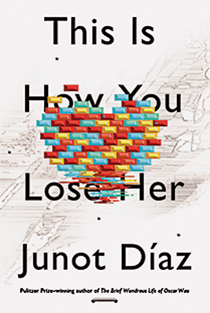 This is a beautiful book that somehow manages to talk about a guy with “mad girls in orbit” and a teenage girl with “a big Dominican ass . . . in a fourth dimension beyond jeans” without sacrificing its elegance. Díaz has followed up his Pulitzer prize-winning novel The Brief Wondrous Life of Oscar Wao (2007) with a book of short stories revolving around a Dominican family in the U.S. Love is ostensibly the subject, though the reader may have to squint to see it through all the lust.
This is a beautiful book that somehow manages to talk about a guy with “mad girls in orbit” and a teenage girl with “a big Dominican ass . . . in a fourth dimension beyond jeans” without sacrificing its elegance. Díaz has followed up his Pulitzer prize-winning novel The Brief Wondrous Life of Oscar Wao (2007) with a book of short stories revolving around a Dominican family in the U.S. Love is ostensibly the subject, though the reader may have to squint to see it through all the lust.
Mostly Díaz deals with men failing rather spectacularly at monogamy, but he also inhabits with great tenderness the point of view of a young woman living with a cheating man who continues to receive letters from a faraway wife. The collection’s last story, “A Cheater’s Guide to Love,” describes a five-year spiral into depression that follows a prodigious (and mostly unrepentant) cheater getting caught, but Díaz shows little enthusiasm for moralizing.
One of the stories is G-rated. Two young Dominican lads step into their first snowy winter to meet their white neighbours, who would rather pelt the black newcomers with snowballs than play with them. Soon, the white families vacate the neighbourhood, fleeing the wave of darker migrants. This less racy interlude is a reminder that the book’s otherwise ubiquitous sex is often just stylized punctuation for stories about struggling immigrants, a brother dying of cancer, and men who don’t quite know their hearts. Díaz’s language is ceaselessly inventive (a flashlight is a “darkness obliterator”; a disgraced boyfriend is treated like he “ate somebody’s favourite kid”) and urban (“whitegirl” is all one word). Spanish proficiency is certainly not required, but it can come in handy.
Díaz is a master of rawness and among the keenest contemporary observers of brown and black urban America. He does not preach. It feels real. He writes that the “half-life of love is forever,” but that is the closest Díaz comes to saying something pretentious. He seems more interested in lived failures than eternal ideals. This book is more about lovers than about love.
Here’s where you can find the current Maclean’s bestsellers list, plus all of our books reviews.